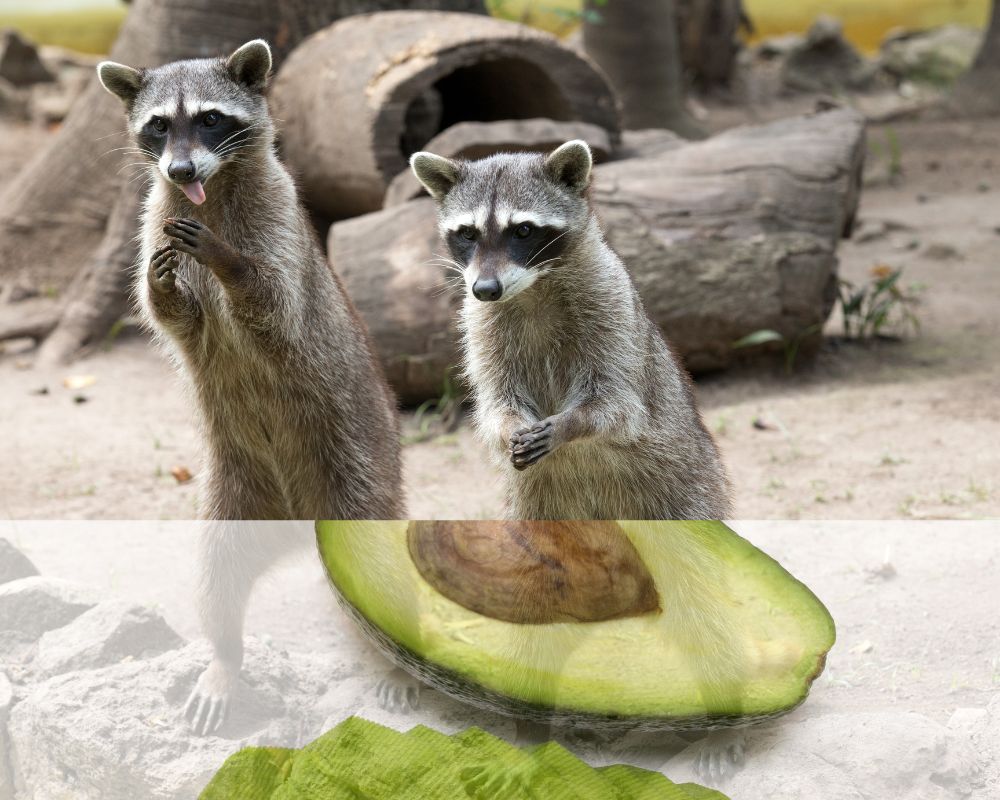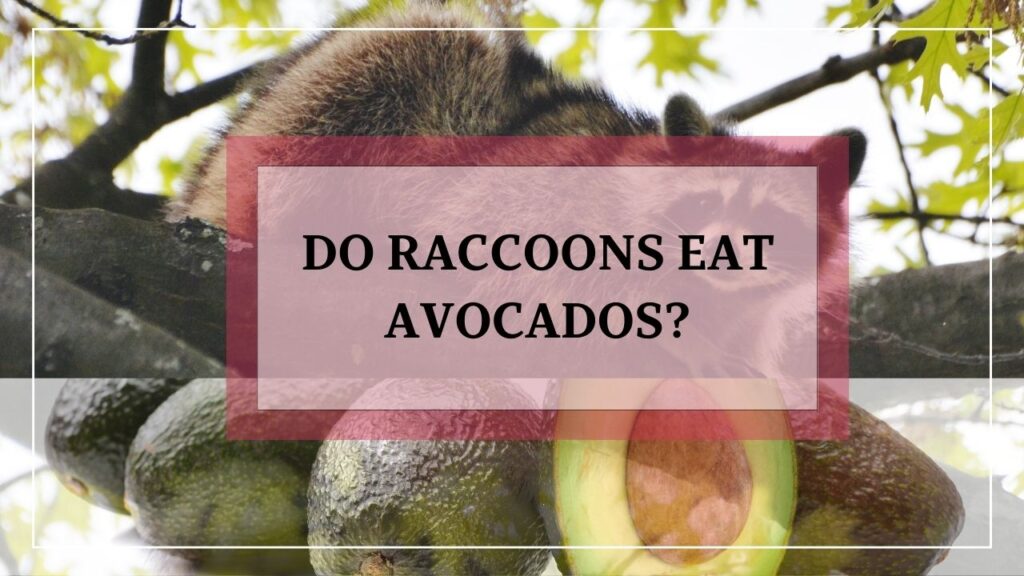Avocados are a versatile and nutritious food enjoyed by millions of people worldwide. However, for avocado farmers and gardeners, this precious fruit can become a target for one of nature’s most cunning creatures – raccoons.
With their sharp claws, agile bodies, and insatiable appetite, raccoons are notorious for raiding orchards and destroying crops. They may hurt your avocados, which are not only expensive but also take years to grow. As a result, many avocado growers are left to face the frustration of having their hard work and investment go to waste.
In this blog post, we will delve into the world of raccoons and avocados, exploring the reasons behind their attraction and their impact on farmers. We will also provide practical and creative solutions for keeping raccoons away from your avocados, ensuring a bountiful harvest and peace of mind.
Whether you’re an avid gardener or a commercial farmer, this post has everything you need to know to protect your avocados from these furry bandits. So, sit back, grab an avocado, and get ready to learn how to keep raccoons at bay!
Do Raccoons Eat Avocados?
Yes, raccoons do eat avocados. Avocados are a delicious and nutritious food that raccoons find irresistible. Raccoons are omnivores and have a varied diet that includes both plant and animal food. They are known to consume a wide range of fruits, vegetables, and nuts, making avocados a staple in their diet.
They are particularly fond of avocados, as they are soft and easy to peel, making them a perfect food source for these furry bandits. Raccoons will often climb trees, fences, or walls to get to the avocados, and once they have a taste, they will return repeatedly.
Why Do Raccoons Love Avocados?

Well, Avocados offer several benefits to raccoons:
Food Source
Avocados are nutritionally rich, which is a big reason why raccoons love them. Avocados are a good source of several key nutrients that are essential for raccoons’ overall health and survival, including:
- Fat: These are important for maintaining raccoons’ overall health and providing energy.
- Fiber: This can aid in digestion and help regulate the raccoons’ metabolism.
- Vitamin C: This helps boost the raccoons’ immune system and protect against disease.
- Potassium: a mineral that is important for maintaining healthy blood pressure and heart function.
- Antioxidants: such as vitamin E and carotenoids, which help protect raccoons against oxidative stress and damage.
Raccoons probably don’t know how much avocados are nutritious for them, however, nature is nature.
Easy To Access
Avocados are widely available in raccoons’ natural habitats, making them a convenient and accessible food source. Avocado trees are often grown in areas where raccoons live, such as suburban and rural areas, providing ample opportunity for raccoons to forage for the fruit.
Available Year-Round
In addition to being readily available, avocados are also available to raccoons throughout the year, providing a reliable food source even when other fruits and nuts may not be in season. This makes avocados an attractive food option for raccoons, who are opportunistic feeders and will take advantage of any readily available food source.
High-Calorie Food
Avocados are high in calories, providing a significant energy source for raccoons.
Raccoons Impact On Avocado Crops
Raccoons can have a significant impact on avocado crops as they are known to feed on fruits. This can cause significant damage to the crops and result in decreased yields and financial losses for farmers.
Raccoons are omnivores and are attracted to avocado crops due to the high-fat content of the fruit. They have sharp claws and can climb trees, which allows them to access ripe avocados. Raccoons can also damage trees by stripping off the bark and climbing to the top of the tree. This can disrupt the tree’s normal growth and reduce the quantity and quality of the fruit produced.
How To Prevent Raccoons From Eating Your Avocados Crops?
Here are 5 ways that we think will help you control raccoons:
1. Secure Lids And Screens
Lids and screens are common methods used to prevent raccoons from eating avocado crops.
- Lids: Avocado growers can use lids to protect crops. Lids made of metal or hard plastic can be placed over the fruit to prevent raccoons from accessing the avocados. This is an effective method, as raccoons are not able to gnaw through the hard material.
- Screens: Screens can also be used to protect avocado crops from raccoons. The screens can be made of a durable mesh material that is difficult for raccoons to chew through. This method works by creating a barrier around the trees or plants, which makes it difficult for the raccoons to reach the fruit. The screens can be supported by poles or frames and can be easily removed for maintenance or harvesting.
Both lids and screens are useful in preventing raccoons from eating avocado crops, but they may require additional measures to be completely effective. For example, growers may need to use other deterrents, such as lights, loud noises, or motion-activated sprinklers, to discourage raccoons from entering the area.
2. Fencing
Fencing is a common method used to prevent raccoons from eating avocado crops. A properly installed fence can be an effective barrier to keep raccoons out of an avocado orchard or farm.
Several types of fencing can be used to protect avocado crops, including:
- High wire fences: The height of the fence makes it difficult for raccoons to climb over it, and the wire mesh or chain link material is difficult for raccoons to chew through.
- Electric fences: The electric shock is not harmful to the raccoons, but it is an effective deterrent. These fences can be more expensive to install and maintain, but they are very effective in preventing raccoons from entering the area.
- Solid barrier fences: This type of fence is made of solid material, such as wood, stone, or concrete. It is an effective barrier to keep raccoons out, but it can be more expensive to install and maintain than other types of fencing.
Regardless of the type of fencing used, it is important to ensure that the fence is installed properly to prevent raccoons from entering the area. This may include digging a trench and burying the fence to prevent raccoons from digging under it or installing a barrier to prevent raccoons from climbing over it.
3. Repellents
Several types of repellents can be used, including:
- Chemical Repellents: Chemical repellents can be sprayed on the crops or around the area to create a barrier that raccoons will avoid. Some chemical repellents contain unpleasant scents or tastes that raccoons do not like, while others contain natural ingredients such as capsaicin (found in hot peppers) that are known to deter raccoons.
- Sonic Repellents: Sonic repellents emit high-pitched sounds that are unpleasant to raccoons. These sounds can be triggered by motion or a timer, and they are designed to scare raccoons away from the area.
- Light Repellents: Light repellents use flashing lights or strobes to scare raccoons away. These lights can be triggered by motion or a timer, and they are designed to be used at night when raccoons are most active.
It is important to note that repellents can be effective in preventing raccoons from eating avocado crops, but they may not be a permanent solution. Raccoons may become accustomed to the repellent over time and may not be deterred by it in the future.
4. Traps
Trapping is a method that can be used to prevent raccoons from eating avocado crops. The idea behind trapping is to capture raccoons that are causing damage to the crops and relocate them to a different area.
Several types of traps can be used to capture raccoons, including:
- Live traps: Live traps are designed to capture raccoons without causing harm. They are usually made of wire mesh or heavy-duty plastic, and they are baited with food to attract the raccoons inside. Once the raccoon is inside, a door closes behind it, trapping the animal inside.
- Kill traps: Kill traps are designed to humanely kill raccoons. These traps are typically made of metal and are baited with food to attract the raccoons. When the raccoon takes the bait, the trap springs closed, killing the animal instantly. (Which, we are highly against and don’t recommend)
Note: Regardless of the type of trap used, it is important to follow all local laws and regulations regarding the trapping and relocation of wildlife. In some areas, trapping raccoons may require a permit, and there may be restrictions on where the trapped raccoons can be relocated.
5. Harvesting Early
Harvest avocados as soon as they are ripe to minimize the attraction for raccoons and to avoid damage to unripe fruit.
FAQs
Is Avocado Toxic To Raccoons?
Avocado is toxic to raccoons and can cause digestive and heart problems. The toxic substance in avocados is persin, which can cause vomiting and diarrhea in raccoons. In severe cases, it can also lead to heart and respiratory problems. It is best to keep avocados and other toxic foods away from raccoons to protect their health.
Also, the pit (seed) of the avocado fruit can be dangerous if ingested by raccoons or other wildlife as it can cause blockages in their digestive system.
Do Possums Eat Avocados?
Yes, possums (also known as opossums) can eat avocados. Avocados, with their high fat and calorie content can be a desirable food source for possums, especially during times when other food is scarce. However, possums can also cause damage to avocado trees and crops by gnawing on bark and branches, so steps to protect their crops from possum damage.
Do Rodents Like To Eat Avocados?
No, rodents are sensitive to eating avocados.
What Animals Can’t Eat Avocados?
Dogs and birds, particularly chickens, are unable to eat avocados as they contain persin, a toxic substance for these species. Eating avocados can lead to digestive issues, respiratory distress, and in severe cases, death.
Other animals that don’t eat avocados include rodents, horses, sheep, and goats.

